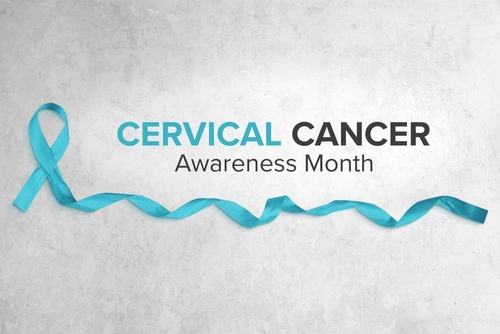
January is Cervical Cancer Awareness Month - the perfect time to raise awareness of the importance of screening for early detection and the potential prevention of this cancer.
Each year, more than 11,000 people in the United States are diagnosed with cervical cancer. Cervical cancer is cancer that starts in the cells of the cervix. But here’s the good news – cervical cancer is highly preventable if you get regular screening and vaccination.
This month serves as a public health campaign to educate people about noticing signs of cervical cancer, getting a vaccination, and checking in with a gynecologist.
Get Screened
Screening tests check for cancerous cells and abnormal cells that could become cancerous. They are performed before someone exhibits any symptoms. Screening can find precancers before they can turn into invasive cancer. Detecting any abnormal changes or precancers early means prompt treatment to reduce the likelihood of cancer developing and spreading.
Dr. Mark Roh, Lee Health’s Chief Physician Executive of Oncology Services, says the Pap and HPV tests are the main screening options.
“Starting at 21, you should get a Pap test every three years,” Dr. Roh says. “From 30-65, a Pap plus HPV test every five years is recommended. Screening can stop at 65-70 if you’ve had normal results or if the cervix has been removed as part of a total hysterectomy for non-cancerous conditions, like fibroids.”
Dr. Roh says a Pap test performed by your primary care doctor or obstetrician-gynecologist (OB-GYN) can find abnormal cells in the cervix, which could turn into cancer.
“The HPV test looks for the human papillomavirus (HPV) that can cause abnormal cell changes. Pap tests can also detect cervical cancer early, and when it’s caught early, it has a high success rate of being cured since it takes about 10 years to develop into cervical cancer.”
WATCH: Preventing Cervical Cancer
Venkata Parsa, M.D., a hematologist-oncologist with Lee Health’s Cancer Institute, says screening enables early detection if cancer is present.
“Screening saves lives because cervical cancer is almost always curable when caught in the early stages,” he says. “Treatment depends on the kind of cervical cancer and whether or how far it has spread, but it can be treated with surgery or chemotherapy and radiation—those are the main options for treatment. Recently, immunotherapy has been shown to improve survival, as well.”
Frances Hutchinson, R.N., a nurse navigator with Lee Health Regional Cancer Center, says almost every case of cervical cancer is preventable. She shares the following preventive information and tips.
Know the Deal with HPV
Almost all cervical cancer is caused by the human papillomavirus or HPV. HPV is a common virus passed through intimate skin-on-skin contact. Most sexually active women will get it at some point. There are many strains of HPV. Some cause genital warts. Other high-risk kinds can lead to cervical and other cancers. Here’s the silver lining – your immune system clears HPV within 1-2 years in most cases. Only long-lasting infections may lead to cancer.
Get the HPV Vaccine
The HPV vaccine protects against the strains most likely to cause cancer. It’s recommended for girls and boys starting at 11-12 years old. Getting it before becoming sexually active gives the best protection. But it can be given through age 26. The vaccine prevents over 90 percent of HPV cancers.
Don't Smoke
Smoking doubles the risk of cervical cancer. The harmful chemicals spread through your body and can damage cells. Not smoking is one of the best ways to lower your cervical cancer risk.
Use Condoms
Using condoms during sex helps prevent HPV and other sexually transmitted infections that increase cervical cancer risk. While not 100 percent effective, condoms provide high protection when used correctly every time.
Get Checkups
See your healthcare provider for regular well-woman visits for screening and to discuss your risks. Report any abnormal discharge, bleeding between periods, pelvic pain, or painful sex – don’t ignore symptoms. Staying on top of your health is key!
Take Charge
While cervical cancer was once a leading killer of U.S. women, rates and deaths have dramatically declined by over 50 percent thanks to screening and HPV vaccines. Arm yourself with knowledge this January on how you can continue this lifesaving momentum through prevention, screening, and vaccination.
As with any screening, diagnosis and treatment plan, it is important to discuss with your doctor or healthcare provider to ensure the right timing and cadence for screenings and the most appropriate treatment.
Get connected with one of our seven Women’s Health offices.
What’s a cervical cancer screening cost?
The cost is part of the screening and is usually covered by insurance. For an estimate, call 239-424-1333.
The best cancer care in Southwest Florida is local
Lee Health Cancer Institute is Southwest Florida’s region’s only accredited comprehensive cancer center. Our nationally recognized center offers care and treatment for nearly every aspect of cancer care under one roof. The center’s national survivorship rates exceed national averages.
The Lee Health Cancer Institute holds nationally recognized accreditations from the Commission on Cancer (CoC), the National Accreditation Program for Breast Centers (NAPBC), the National Pancreas Foundation and the GO2 Foundation for Lung Cancer.
Regional Cancer Center
8931 Colonial Center Drive
Fort Myers, FL 33905
239-343-9500
Richard M. Schulze Family Foundation Cancer Clinic at the Bonita Health Center
Patients now have access to innovative treatment therapies, clinical trials, and research in the South Lee community. To expand oncology services to residents and visitors of South Lee and Collier counties, the Richard M. Schulze Family Foundation Cancer Clinic at the Bonita Health Center at Coconut Point opened in September.
3501 Health Center Blvd.
Estero, FL 34135
239-343-9500
Get Directions

